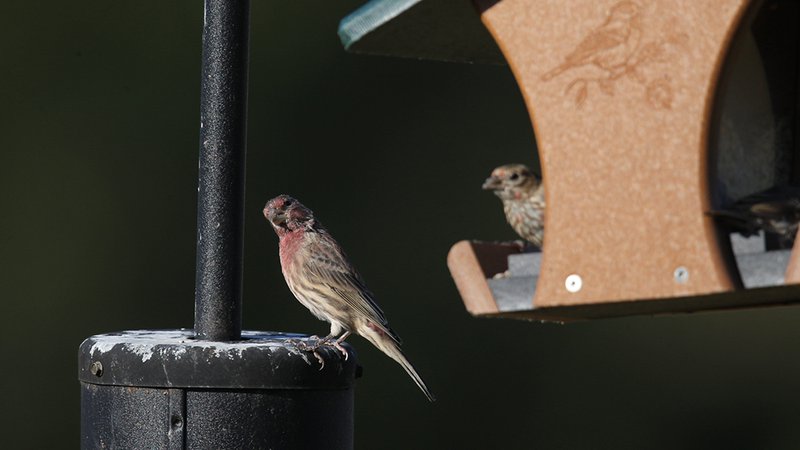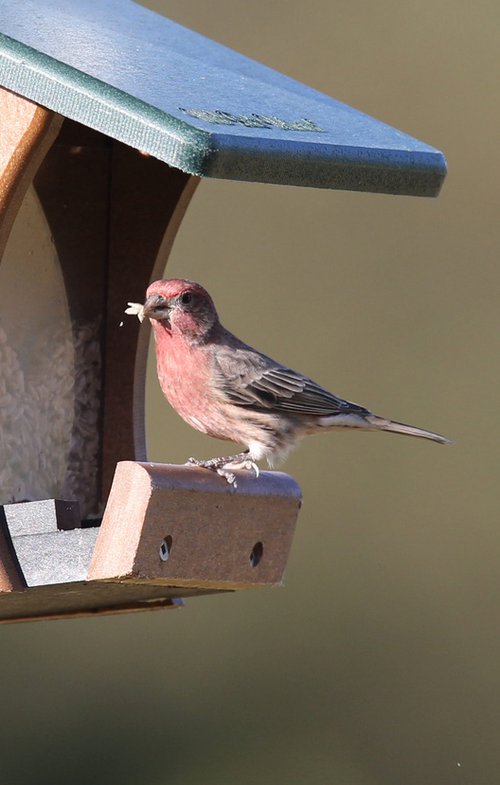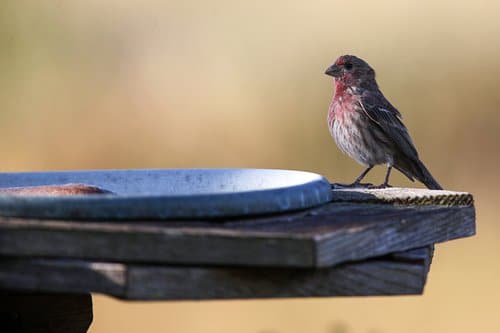Don’t be a superspreader; keep bird feeders clean
ON 03-17-2021

March 17, 2021
Randy Zellers
Assistant Chief of Communications
LITTLE ROCK – The Arkansas Game and Fish Commission would like to remind everyone to take the time to keep bird feeders clean and prevent the spread of diseases among the feathered friends you are trying to help.
Karen Rowe, nongame migratory bird program coordinator for the AGFC, has seen an increase in the number of birdwatchers reporting house finches, purple finches and goldfinches with a crusty infection around their eyes.
“The infection is from a disease called mycoplasmal conjunctivitis, or finch conjunctivitis,” Rowe said. “It can cause the birds’ eyes to swell and have a residue that dries up into a crusty layer over the eye. It can lead to blindness, increased predation rates and eventually death.”

Although finches are the primary birds associated with this disease, it has been reported in up to 30 other wild bird species in North America.
The pandemic has reinforced the knowledge that the spread of some diseases can be slowed by avoiding concentrations of people and keeping things sanitary. The same methodology applies to many wildlife diseases, including finch conjunctivitis. High populations of birds concentrating on feeders increase the chances for disease to be transmitted. At least five known diseases can be transmitted among birds concentrated at feeders. Not only can these diseases be passed from bird to bird, but they also can be transmitted from feeders infected birds have visited.
Dr. Jenn Ballard, state wildlife veterinarian for the AGFC, says the bacteria that causes conjunctivitis is spread from bird-to-bird through contact with feeders and other surfaces where infected birds have been.
“With many birds concentrating on a feeder, it only takes one that has a disease to spread it to many others,” Ballard said. “Wildlife diseases such as this are not uncommon, and the best way to combat them is to prevent their spread through manmade sources such as dirty feeders.”
Ballard says if a person spots a bird at their feeder that shows signs of disease, the best way to help is to remove the feeder for at least two weeks, disinfect it with a bleach-and-water solution and allow it to dry completely before setting it out again with fresh seed.
“While finch conjunctivitis isn’t transmissible to people or pets that are mammals, other diseases that can be spread at bird feeders are, so proper hygiene is very important,” Ballard said.
Wearing rubber gloves when cleaning feeders and making sure to wash and disinfect all items coming in contact with the dirty feeder are highly recommended. It’s also helpful to clean the surrounding area where the feeder was placed of any hulls, seeds or droppings that may exist.
“It’s a good practice to keep your feeders clean whether you’ve spotted sick birds or not,” Ballard said. “When you feed wildlife, you are unnaturally concentrating animals, which can lead to problems unless precautions are taken.”
Ballard suggests people who want to use feeders look for those without platforms or wide perches where droppings can accumulate and help spread bacteria. Wooden feeders, while pretty, can also increase the risk of disease transmission as they are much more difficult to disinfect. Multiple feeders that hold low amounts of food also are preferred, as they help spread birds out instead of piling up on a single feeder. Frequent refilling also will help you remember to give it a good cleaning on occasion.

Karen Rowe explains that feeders are simply a supplement to the natural diet of Arkansas songbirds and removing feeders for two weeks will not cause the birds to go hungry. In March, Arkansas birds are feeding on insects as well as tree, shrub and flower buds. The nutrients in these natural foods enable them to get in good body condition for the breeding season. Rowe says that the ideal way to provide food for songbirds in your yard is to provide a wide variety of native trees and shrubs that provide fruits and berries at different times throughout the year. Songbirds get the protein they and their young require from insects that are found on native plants.
If you see groups of sick or dead birds, please report them to AGFC using the wildlife health reporting system at agfc.health@agfc.ar.gov. Please include your contact information, the date and time of the observation, the location of the event, the number and species of animals affected, a description of what you observed and any pictures or videos you have with your report.
Recent News

Waterfowl Report: Better Conditions Greet Hunters
Dec. 12, 2025

Lonoke hatchery staff making room for megabass
Dec. 11, 2025
Subscribe to Our Weekly Newsletter E-mails
Don’t miss another issue. Sign up now to receive the AGFC Wildlife Weekly Newsletter in your mailbox every Wednesday afternoon (Waterfowl Reports are published weekly during waterfowl season and periodically outside the season). Fishing Reports arrive on Thursdays. Fill in the following fields and hit submit. Thanks, and welcome!
